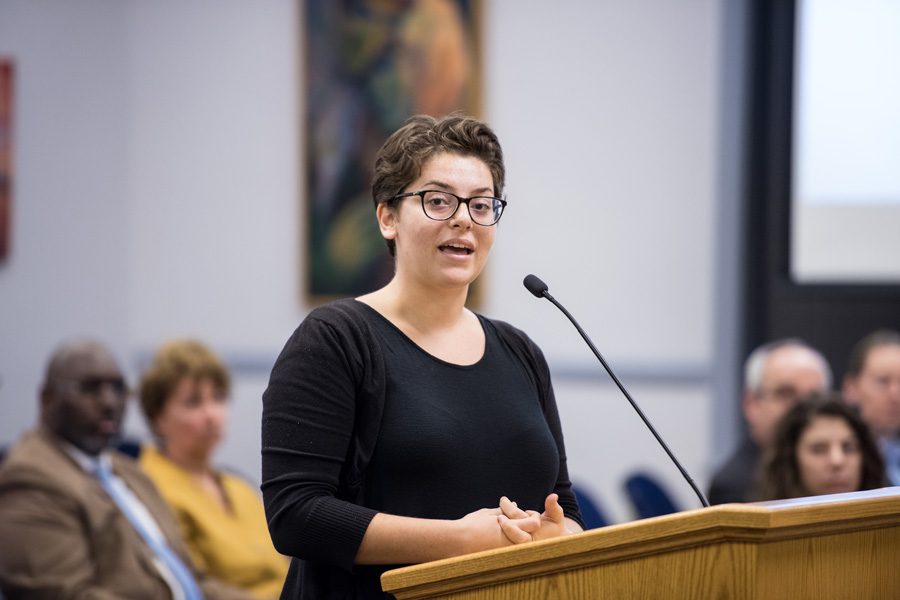ASG president signs statement calling for elimination of application fees for first-generation, low-income students
Daily file photo by Colin Boyle
ASG President Christina Cilento addresses aldermen, the mayor and city staff in October. Cilento signed a statement published Wednesday calling for colleges and universities to eliminate application fees for low-income and first-generation students.
February 17, 2017
Associated Student Government President Christina Cilento signed on to a statement published Wednesday calling for colleges and universities to remove application fees for first-generation and low-income students.
The statement, titled “No Apologies Initiative,” was written by Viet Nguyen — student body president at Brown University and director of 1vyG, an organization dedicated to first-generation students in the Ivy League — and urges the elimination of application fees for first-generation and low-income students for the 2017-18 academic year. Student body presidents of all eight Ivy League schools, in addition to those of Stanford and University of Chicago, signed the statement.
The statement describes Nguyen’s personal experiences applying to schools while unable to pay for application fees. Though Nguyen appealed to the schools he applied to and got the fees waived, the process was “humiliating” and “unnecessary,” the statement said.
“Even with the availability of waivers, it takes a certain level of self-advocacy and knowledge of the educational system to know to even ask for them, knowledge that is inherently less accessible for those who are the first in their families to go to college,” it said.
According to a White House study cited in the statement, application fees are one of the main deterrents for low-income students from applying to certain schools. Schools such as Bowdoin College already waive application fees automatically for all first-generation students and students on financial aid, according to the statement.
Cilento said Nguyen reached out to ask her to sign on to the statement. The letter’s mission of making college more financially accessible mirrored much of Cilento’s work at Northwestern, she said.
Cilento met with Patricia Telles-Irvin, vice president for student affairs, and University President Morton Schapiro in January to discuss ways to increase socioeconomic diversity on campus and support for low-income students.
The University’s work to increase socioeconomic diversity on campus has resulted in the percentage of students who are eligible for Pell Grants, a federal grant for low-income students, increasing from 12.5 percent in the class of 2018 to 17 percent in the class of 2020. The University aims to get 20 percent of all students Pell-eligible by 2020.
According to a study published in The New York Times on Jan. 18, 14 percent of Northwestern students come from families who make $630,000 or more per year, placing them among the top 1 percent of earners. Only about 3.7 percent of students come from households earning $20,000 a year or less, placing them in the bottom quintile.
Schapiro told The Daily that nearly all low-income students already get their application fees waived. Programs such as Posse Scholarships, Quest Scholars and Good Neighbor, Great University all remove financial barriers for low-income students at Northwestern, he said. Northwestern also removed loans for incoming students in March 2016 as part of changes to its financial aid program.
“This is my field, so we’ve been very proactive everywhere we’ve been in not charging fees for anybody for whom the fee would be a barrier,” Schapiro said.
Still, Cilento said going through additional applications and paperwork to waive fees can be onerous. Having fees automatically removed would make applying to Northwestern more equitable for low-income students, she said.
“We want to make it a little bit more accessible to students so they don’t … have to go through extra steps that can be pretty big barriers and to be able to apply with comfort and feel as though they are welcomed by the University,” Cilento said.
Email: [email protected]
Twitter: @matthewchoi2018












